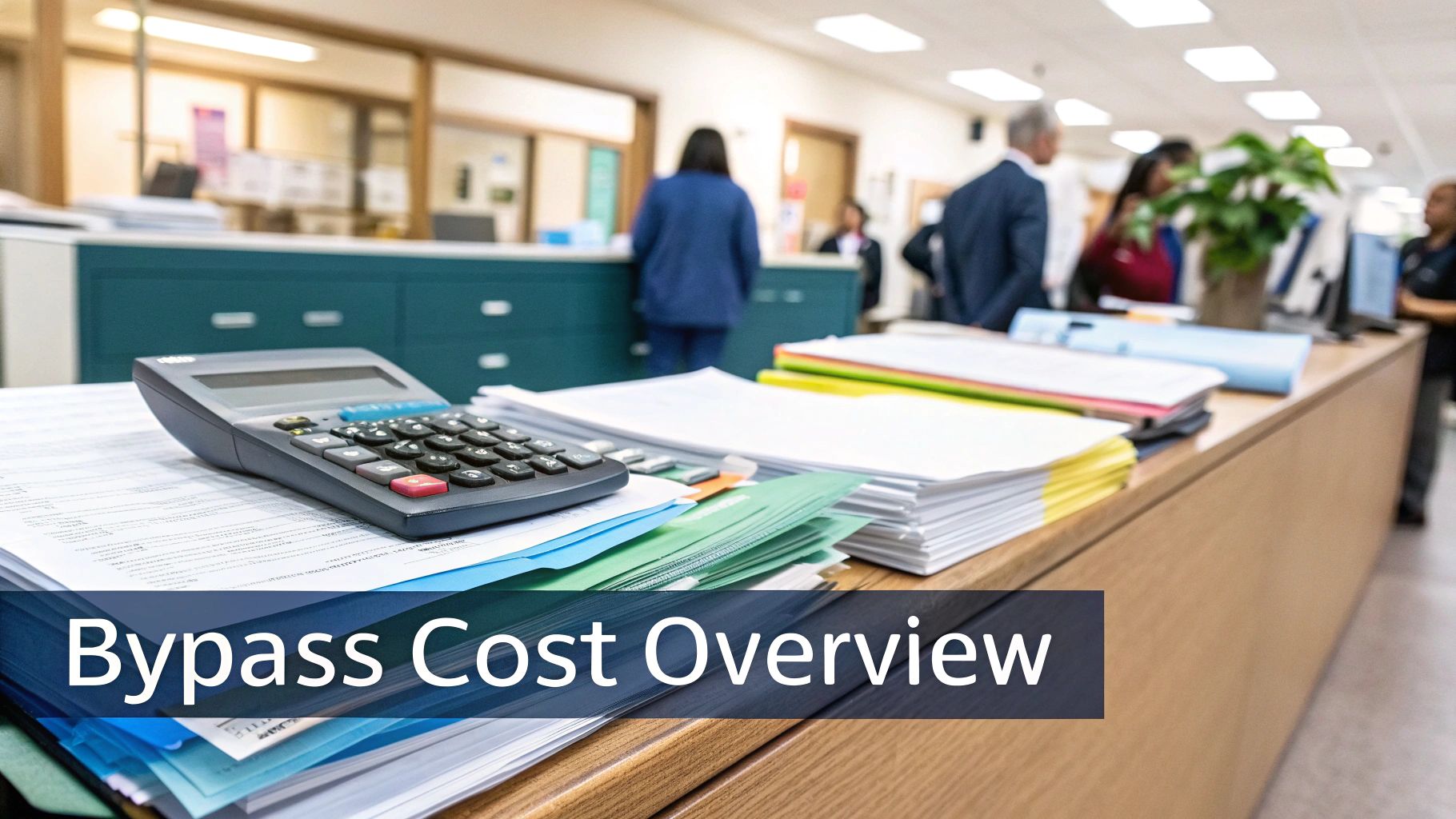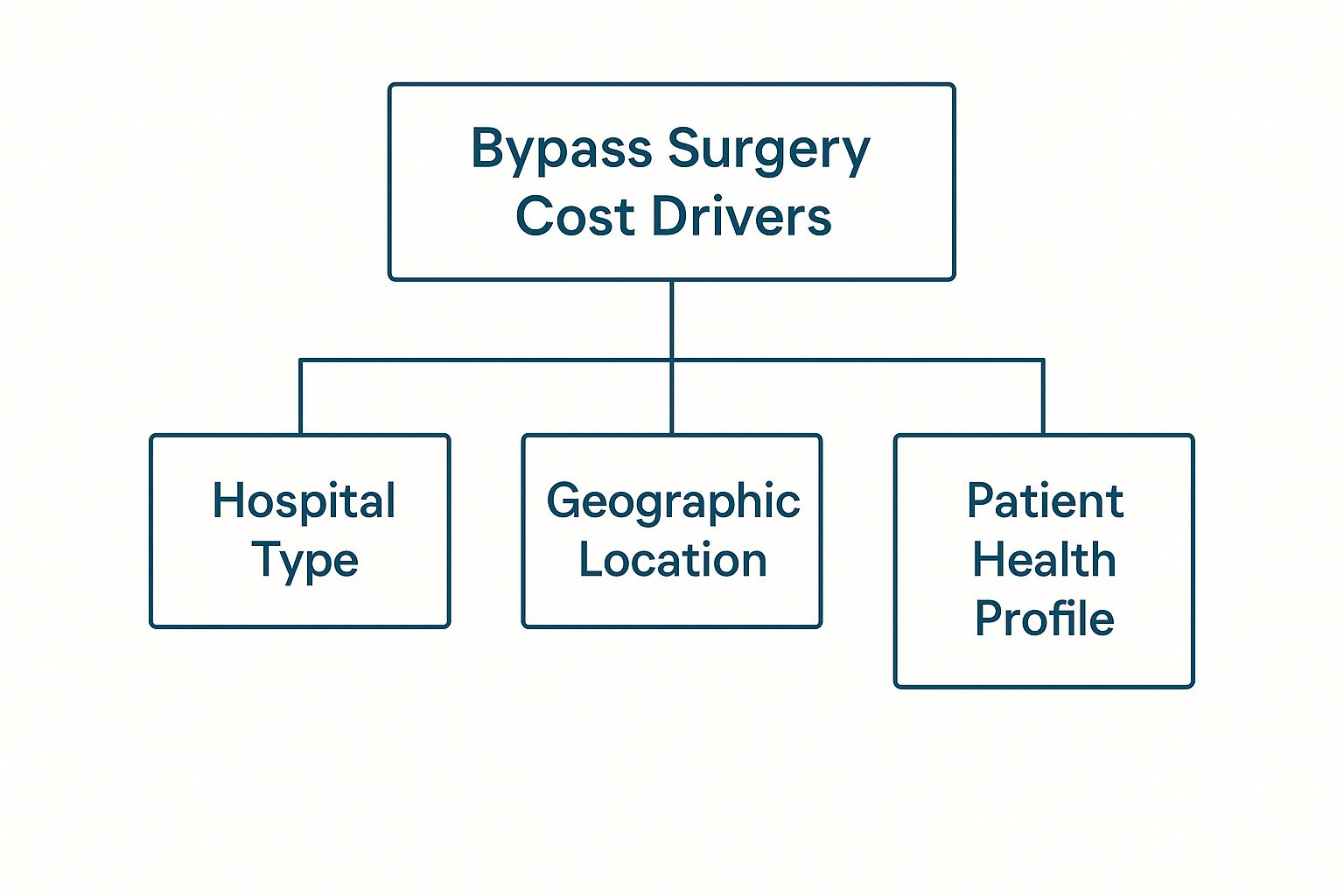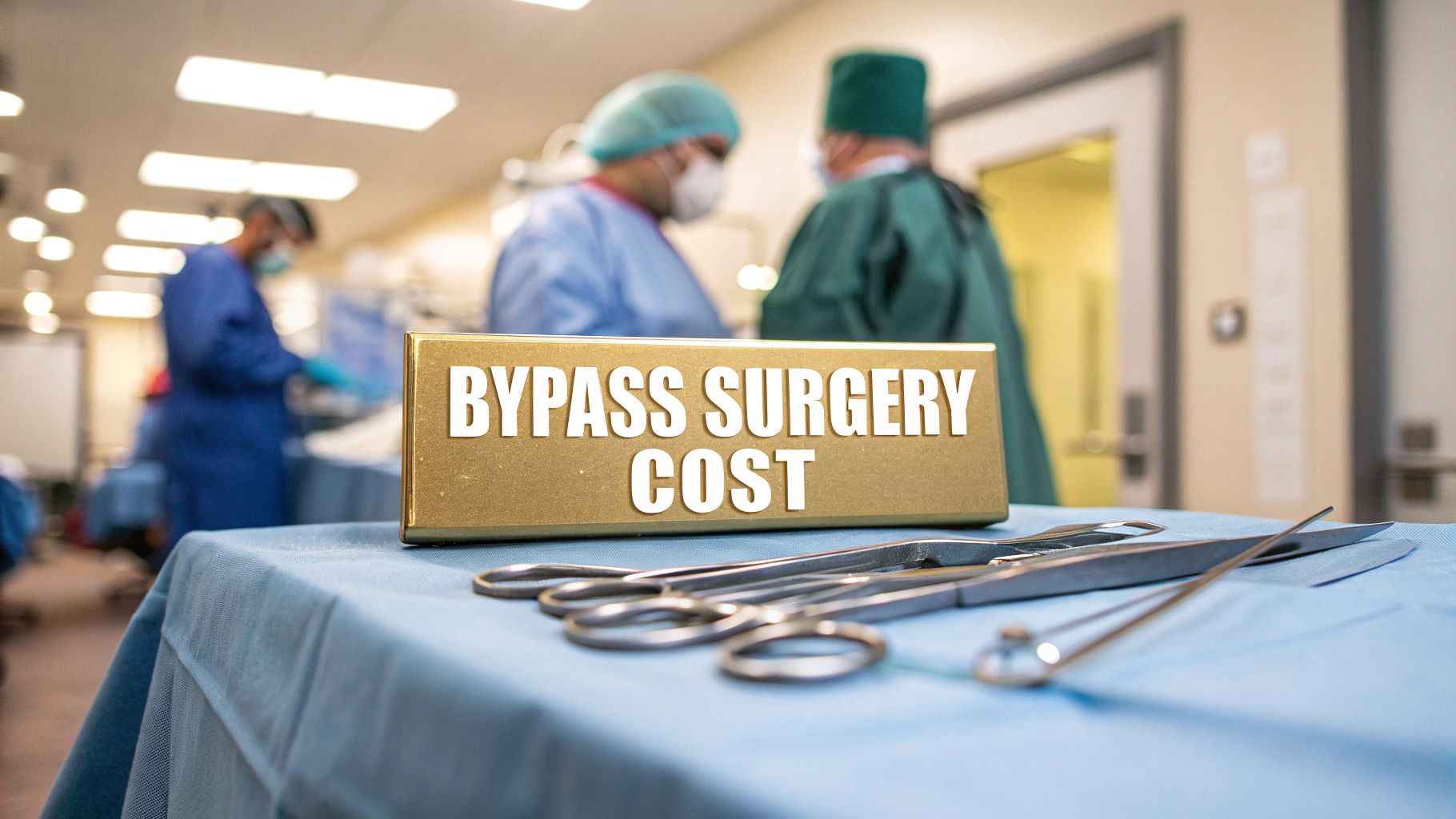.webp)
When you’re facing something as significant as bypass surgery, it’s completely natural for urgent questions to bubble up, especially around the cost.
In the UK, we have a dual system for this life-saving procedure. For most, it's provided free at the point of service through the NHS. But if you go private, the bypass heart surgery cost can be substantial, often landing somewhere between £15,000 to £25,000, and sometimes more.

Think of it like planning a major home renovation. The final bill isn't just one single number; it's a sum of different experts, materials, and resources all coming together. The NHS route is like a fully-funded public works project—essential, vital, and covered by everyone through taxation.
Going private, on the other hand, is like hiring your own architect and building firm for a bespoke project. You get far more control over the timing, the team, and the amenities, but that control comes with a direct price tag.
For the vast majority of UK residents, bypass surgery happens on the NHS. You won’t see a bill for the operation itself, as it’s funded by national insurance and taxes.
The main factor here isn't a direct financial hit, but time. Waiting lists are a reality, and their length can vary depending on where you live and how urgent your case is clinically. The standard of care is excellent, but you have less say over who your surgeon is or which hospital you're treated in.
Choosing to go private puts you in the driver's seat. You can pick your surgeon and hospital, which almost always means shorter waiting times and a more comfortable recovery in a private room.
This flexibility, however, is what you pay for. If you're wondering exactly what that entails, our guide on what is private healthcare breaks it all down. The final invoice is a tally of several key parts:
A fascinating study comparing cardiac surgery costs between 2009 and 2013 found the median NHS hospital cost for a bypass was around £8,884. This figure is dramatically lower than the $49,005 reported in New York State during the same period, really highlighting the efficiency of the UK's public system.
To make things clearer, let's look at a head-to-head comparison of the two paths.
The table below offers a straightforward look at what you can typically expect from each option, helping you see the core differences in cost, choice, and experience.
Ultimately, whether you stay with the NHS or go private depends on your priorities—be it cost, speed, or personal choice. Both routes are designed to deliver exceptional medical outcomes.
When you get the final invoice for private surgery, it can feel a bit like looking at a complex puzzle. But once you understand what each piece represents, you get a much clearer picture of the true value behind the bypass heart surgery cost.
Let’s unpack the typical components of that bill, so you can see exactly where your investment is going. Think of it less as a single lump sum and more as a collection of highly specialised services, expertise, and resources all coming together for your procedure. The final figure is really built on three core pillars: the fees for your expert team, the hospital charges, and the cost of all diagnostics and supplies.
This breakdown shows the main factors that shape the overall cost of your surgery.

As you can see, the specific hospital, the type of facility you choose, and your own health profile are the biggest drivers of the final bill.
A huge part of your bill covers the incredible skill of the people in the operating theatre. This isn't just one fee, but several, accounting for the entire team dedicated to your surgery.
The combined experience of this team is absolutely critical for a successful result, and their fees directly reflect that level of specialisation.
The next major component is all about the hospital itself—the use of its state-of-the-art facilities and the dedicated care you receive during your stay.
These charges generally include:
It’s useful to have a benchmark. Even within the NHS, these procedures are costly. Tariff data from 2015/16 showed the average cost for complex heart operations like a bypass graft was often in the £8,000–£12,000 range. This helps put private fees into perspective.
Finally, the bill will include the costs for all the tests and materials that make the procedure possible and safe. These are essential for mapping out the surgery and ensuring your recovery goes smoothly.
This category covers a whole host of things:
By understanding how these different elements fit together, the total on your bill becomes much less intimidating. For a more detailed look, you can review a typical private hospital price list for various procedures to see how these costs are usually presented.

The price tag for private bypass surgery isn’t the same everywhere in the UK. Much like the cost of living, the bypass heart surgery cost can shift dramatically depending on where you are. A procedure in central London, for example, will almost always be more expensive than the exact same surgery in Manchester, Birmingham, or Glasgow.
This isn’t random. The price difference is a direct result of local economic factors. Getting to grips with these regional variations can help you make a smarter decision about where to have your treatment, letting you find the right balance between cost, convenience, and world-class care.
Let's be honest, London is one of the most expensive cities on the planet, and its private healthcare market is no exception. There are a few key reasons why having surgery in the capital costs more.
Put it all together, and it’s clear why choosing a hospital on or around the famous Harley Street will almost certainly mean a bigger invoice.
Once you step outside the M25, the financial picture often changes for the better. Major cities across the North of England, the Midlands, and Scotland tend to offer much more competitive pricing for private bypass surgery.
While the quality of care remains exceptionally high, these hospitals simply have lower overheads. Property is more affordable, and general running costs are reduced, allowing them to perform the same complex procedures at a more accessible price. For anyone paying for their own treatment, it’s well worth exploring what facilities in cities like Manchester, Leeds, or Edinburgh have to offer.
While prices vary, the exceptional standard of surgical care does not. Hospitals throughout the UK are held to the same rigorous standards by the Care Quality Commission (CQC), ensuring that patient safety and clinical excellence are paramount, regardless of location.
For a detailed breakdown of what different hospitals offer, you can learn more about our services and the standards of care you should always expect.
To give you a clearer idea of what this means in practice, here are some ballpark estimates for private bypass surgery packages across the UK.
Remember, these figures are just estimates and can shift based on the details of your case. Still, they paint a clear picture: where you choose to have your surgery can change the final bypass heart surgery cost by thousands of pounds.
The final bill for heart surgery doesn’t just cover what happens in the operating theatre. The recovery journey starts the moment you leave the hospital, and this next phase has its own set of costs that are crucial to budget for.
Thinking about the total bypass heart surgery cost has to include these often-overlooked expenses. Planning for them upfront helps you avoid financial stress when your only job should be focusing on getting better. These aren't optional extras; they're essential investments in a full, long-term recovery.
After a major heart procedure, your specialist will almost certainly recommend a cardiac rehabilitation programme. This isn't just about gentle exercise. It’s a structured, medically supervised plan designed to help you regain strength, boost your heart's health, and rebuild your confidence safely.
These programmes typically include:
While some programmes are available on the NHS or covered by private insurance, others might have out-of-pocket fees for sessions or consultations.
Your recovery will be watched closely by your cardiology team to make sure everything is healing correctly. This means a series of follow-up appointments with both your surgeon and cardiologist, which are vital for tracking your progress.
Post-operative care is a massive undertaking. In the UK, around 11,700 coronary artery bypass procedures were performed in 2022/23. That’s a huge number of patients who all need dedicated, ongoing support to recover properly.
These check-ups often involve diagnostic tests to keep an eye on your heart function. For instance, your specialist will likely schedule follow-up scans, so understanding what’s involved in an echocardiogram can help you feel more prepared. Each private consultation and test adds to the final figure, so it’s smart to get a clear schedule from your provider beforehand.
You’ll probably go home with a few new prescriptions. These medications are non-negotiable—they’re essential for preventing blood clots, managing blood pressure, and keeping cholesterol in check.
Common long-term medications include:
The cost of these prescriptions can add up quickly, becoming a new, regular line item in your monthly budget.
You might also need to make a few small adjustments at home to create a safe recovery space. This could mean buying equipment like a shower chair or an adjustable bed, or even simple items to help you rest more comfortably. Things that aid relaxation can be surprisingly helpful, so it’s worth exploring the benefits of weighted blankets, which are known for their calming effects. While they might seem like minor expenses, they all contribute to a smoother, safer healing environment.

Facing a significant medical bill can feel daunting, but thankfully, there are several well-established ways to make the bypass heart surgery cost more manageable. Getting to grips with these options is the first step toward building a clear financial plan, freeing you up to concentrate on what really matters—your health.
Whether you have private medical cover, plan to pay directly, or need to explore financing, a structured approach brings clarity and much-needed peace of mind. Let’s walk through the main ways to fund your procedure.
For many, private medical insurance is the obvious first port of call. If you have a policy, your first move should be to contact your provider immediately. You need to understand exactly what your cover includes for cardiac surgery.
Insurance policies aren't all cut from the same cloth, so it's vital to clarify a few key points:
If you don't have insurance or your policy doesn’t quite cover everything, paying directly is a common and straightforward alternative. This is often known as being a "self-pay" or "self-funding" patient.
To make the bypass heart surgery cost predictable, most private hospitals offer fixed-price packages. These are a huge help because they bundle all the core costs into one transparent figure, which is quoted to you before you commit.
A typical self-pay package usually covers your surgeon and anaesthetist’s fees, hospital room, operating theatre costs, standard nursing care, and routine post-op check-ups. Always ask for a detailed list of what is and isn't included.
This approach eliminates the worry of surprise bills, as long as no major, unforeseen complications arise. It gives you complete control and certainty over the final cost.
When paying the full sum upfront just isn't realistic, dedicated medical loans are another practical solution. These are essentially personal loans designed specifically for healthcare expenses, letting you spread the cost over a manageable timeframe.
Many private hospitals even partner with specialist finance providers to offer plans with competitive interest rates. Of course, you can also secure a loan from a bank or another financial institution. To get a better feel for the different borrowing options out there, it’s worth reviewing an ultimate guide to personal loans.
Before signing anything, carefully look at the terms:
Each of these funding methods has its own pros and cons. The right choice really comes down to your personal financial situation and what you feel most comfortable with. The table below gives a quick comparison to help you weigh things up.
Ultimately, taking the time to properly investigate these routes will empower you to make a confident and well-informed financial decision for your heart care.
Trying to get your head around the financial side of a major operation can feel almost as daunting as the surgery itself. When it comes to the bypass heart surgery cost, it’s completely normal to have a long list of questions.
We’ve put together clear, straightforward answers to the queries we hear most often. The goal is to cut through the confusion and help you feel more confident as you plan for your treatment.
This is a great question, and the short answer is: yes, sometimes. Under an NHS scheme called 'Patient Choice', you might be given the option to have your surgery at a private hospital, funded by the NHS. This usually happens when the waiting list for your specific operation in your local area is considered clinically too long.
However, it’s not an automatic right. Your eligibility really depends on the policies of your local Clinical Commissioning Group (CCG) and what agreements they have with private hospitals. It’s definitely something worth discussing with your GP and cardiologist. They’ll be able to tell you if you meet the criteria and help you with the referral process.
It’s also vital to get clarity on exactly what is covered. While the main surgical procedure is typically included, you need to double-check if the funding also covers:
Confirming these details upfront will save you from any unexpected bills for things you thought were part of the package.
This is probably one of the most critical financial questions to ask before you commit to anything. While the risk is low, complications are a possibility with any major surgery, and knowing where you stand financially is essential for your peace of mind.
To give patients certainty, many private hospitals offer ‘fixed-price’ or ‘all-inclusive’ packages for procedures like coronary artery bypass grafts (CABG).
A good fixed-price package will usually include a clause that covers the costs of re-admission and treatment for any direct complications that pop up within a certain period, like the first 30 days after you go home.
But the devil is always in the detail. Make sure you read the terms and conditions very carefully. Ask for a written explanation that clearly states what counts as a "related complication." A major, unforeseen event that requires a much longer stay in the Intensive Care Unit (ICU) or more unplanned surgeries might not be covered by the standard package, which could lead to significant extra costs. Always ask for a worst-case scenario breakdown so you fully understand your potential financial risk.
Looking at generic price lists online can be misleading because they don't account for your unique medical needs. The only way to get a truly reliable quote for your bypass heart surgery cost is to have a formal consultation at your chosen private hospital.
Here’s what that process usually looks like:
This quote should be in writing and break down all the expected costs—from the surgeon and anaesthetist fees to your hospital stay and medication. When you receive it, check how long the quote is valid for and exactly what it includes. Don’t be afraid to get quotes from a couple of different hospitals to compare their facilities, offerings, and overall value. This is a big decision, and seeing a few options is key. To get a better sense of a hospital's expertise, it's also helpful to look at their full range of cardiology services.
The idea of 'medical tourism'—travelling to another country for a cheaper procedure—can seem very attractive at first glance. While the headline prices in some countries might look much lower than in the UK, this route is packed with significant, and often hidden, risks.
First off, the initial price tag is rarely the final price. You have to add the cost of flights, accommodation for yourself and a companion (who is absolutely essential for support), and living expenses for what could be several weeks. Once you tally all that up, the "savings" can shrink pretty quickly.
More importantly, there are serious health and practical issues to think about:
While saving money is important, your health and safety have to come first. The potential for serious complications and the difficulty in arranging aftercare make this a high-risk option that needs a huge amount of research and a real understanding of the downsides.
At The Vesey, we believe in transparent, patient-first care. If you have more questions about planning your treatment, our dedicated team is here to provide the clarity and support you need. Learn more about our world-class facilities and specialists at https://www.thevesey.co.uk.

